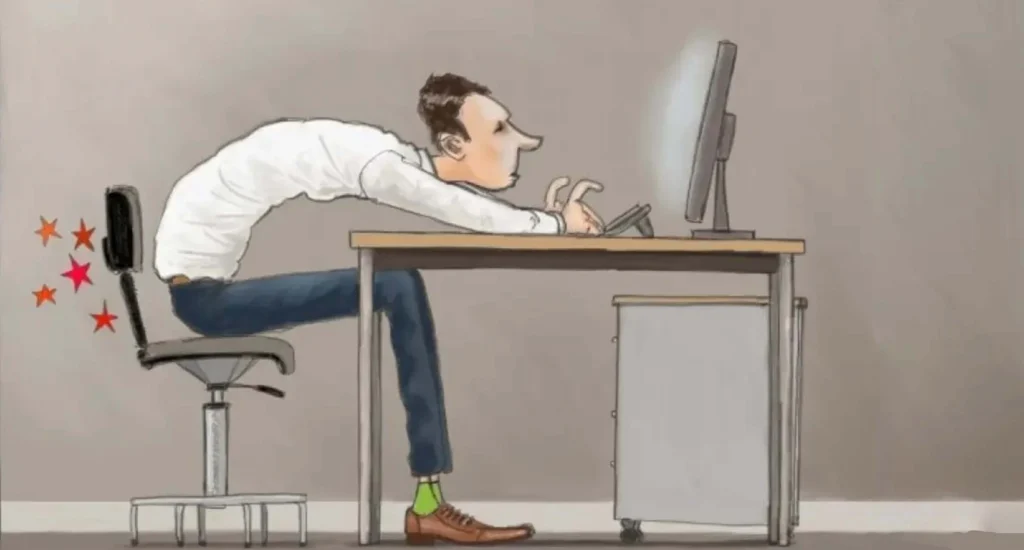Sitting for Too Long? Here’s What It’s Doing to Your Spine
- Fahad Bin Khalid
- January 20, 2025
- 2:05 pm
- 29
- Food & Lifestyle

The effects of prolonged sitting on the spine can be serious. Many people spend hours sitting at work, watching TV, or using their phones. This modern lifestyle is convenient, but it can negatively impact your spine. Dr. James Levine, the inventor of the treadmill desk, famously said, “Sitting is the new smoking.” Let’s explore how prolonged sitting affects your spine and how to protect it.
Why Sitting is a Problem for Your Spine
Sitting for long periods can harm your spine by affecting its normal alignment. The human body is not designed to stay motionless for hours. Sitting compresses the spinal discs, which are gel-like cushions between vertebrae. Over time, this pressure can cause aches, stiffness, and long-term damage.
Slumping or hunching over a desk, for example, increases strain on your muscles and spine. This strain can lead to serious conditions like herniated discs and chronic back pain.
What Happens Inside Your Spine
Your spine is not just a stack of bones. It is a complex system of nerves, muscles, and tissues that work together to support your body. Here’s what happens when you sit for too long:
- Reduced blood flow: Sitting for long periods restricts circulation, limiting the nutrients and oxygen your spine needs.
- Increased pressure on discs: Prolonged sitting compresses spinal discs, causing pain and discomfort.
- Muscle weakness: Sitting too much weakens core muscles that support your spine, leading to poor posture.
These changes may not cause immediate pain, but over time, they can lead to structural problems with your spine.
Common Spinal Issues Linked to Sitting
If you sit for long periods every day, you might experience one or more of the following spinal issues:
- Lower back pain: Prolonged sitting is a leading cause of lower back pain, a common complaint.
- Sciatica: Sitting for too long can irritate the sciatic nerve, causing sharp, radiating pain in your legs.
- Cervical strain: Poor posture while sitting can strain the neck, leading to stiffness and pain.
- Spinal misalignment: Sitting improperly for extended periods can cause misalignment, affecting overall posture.
These conditions can affect your quality of life and your overall health.
How to Protect Your Spine While Sitting
The good news is you don’t have to stop sitting entirely to protect your spine. By making small adjustments to your habits, you can reduce the negative effects. Here are some simple tips:
- Adjust your workspace: Make your desk and chair ergonomic to support your posture.
- Take regular breaks: Stand, stretch, and walk around every 30 minutes to relieve pressure on your spine.
- Strengthen your core: Core exercises help support your spine, reducing the risk of back pain.
- Use a supportive chair: A chair with good lumbar support helps maintain the natural curve of your spine.
Implementing these changes can help protect your spine and reduce discomfort.
The Benefits of Breaking the Sitting Cycle
Taking breaks and improving your posture can do wonders for your health. Not only will it protect your spine, but it also boosts your overall well-being.
- Better breathing and digestion: Sitting upright promotes better posture, which improves breathing and digestion.
- Reduced risk of heart disease and diabetes: Regular movement lowers the risk of chronic conditions linked to a sedentary lifestyle.
- Increased energy and focus: Standing and stretching can refresh your body and mind, making you more productive throughout the day.
By breaking up long periods of sitting, you can feel more energized and focused while protecting your spine.
Conclusion
The effects of prolonged sitting on the spine are real and can lead to serious health issues. Awareness of the risks and making simple adjustments, such as standing regularly, improving your posture, and strengthening your core, can make a significant difference. Your spine is the backbone of your health, so treat it with care. As Dr. Levine suggests, movement is the best way to prevent the harmful effects of sitting. Get up, stretch, and protect your spine!



